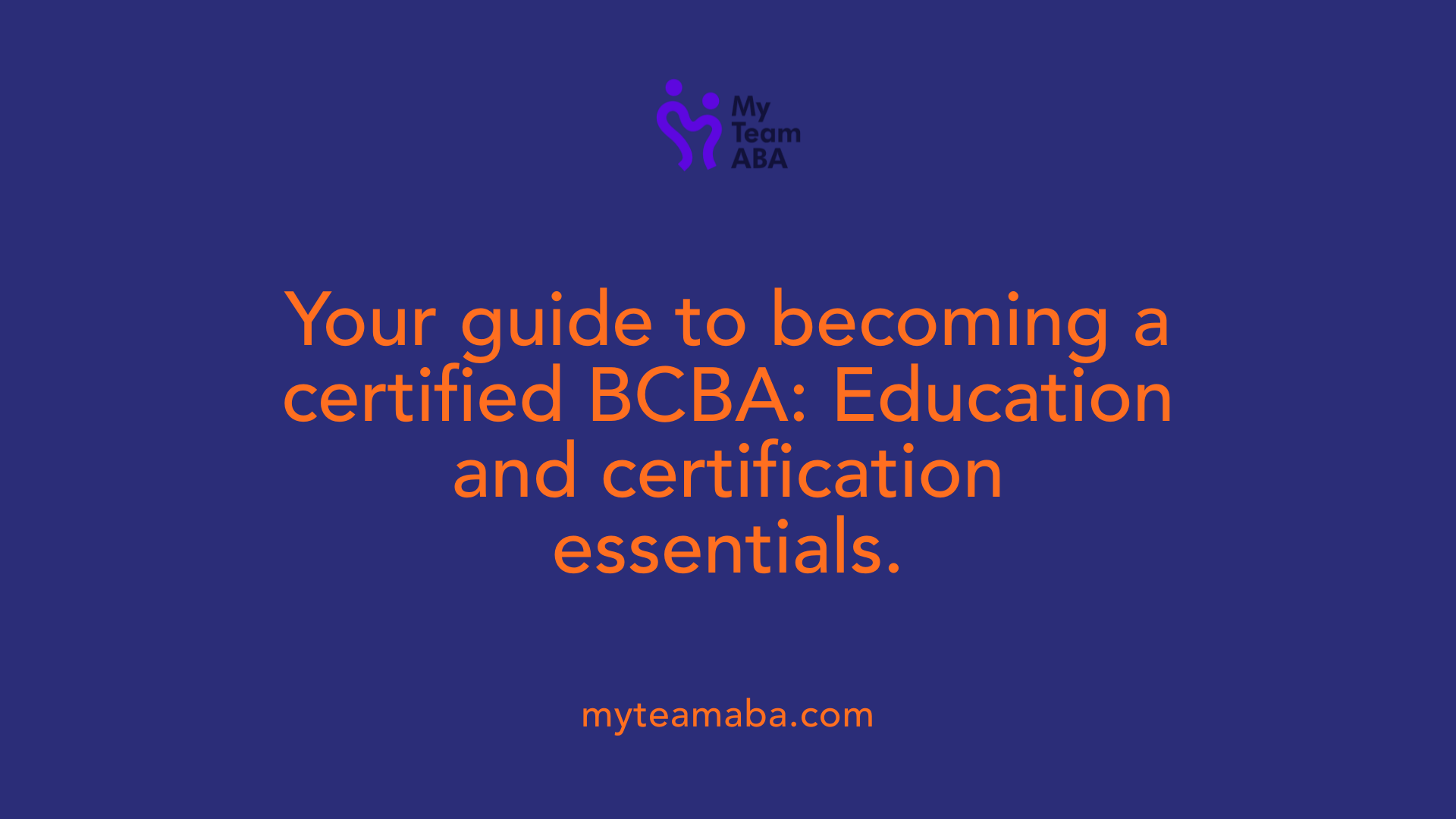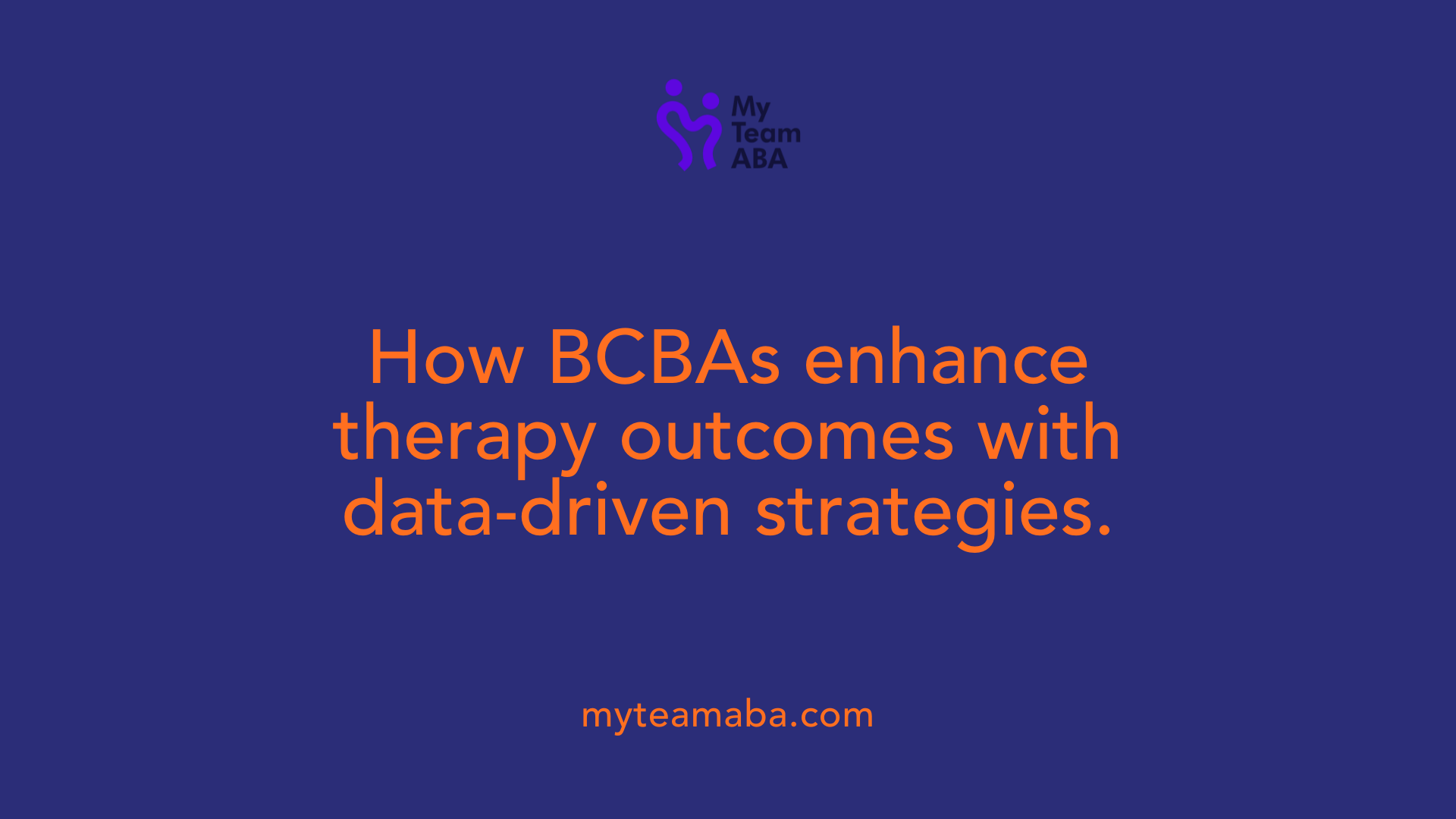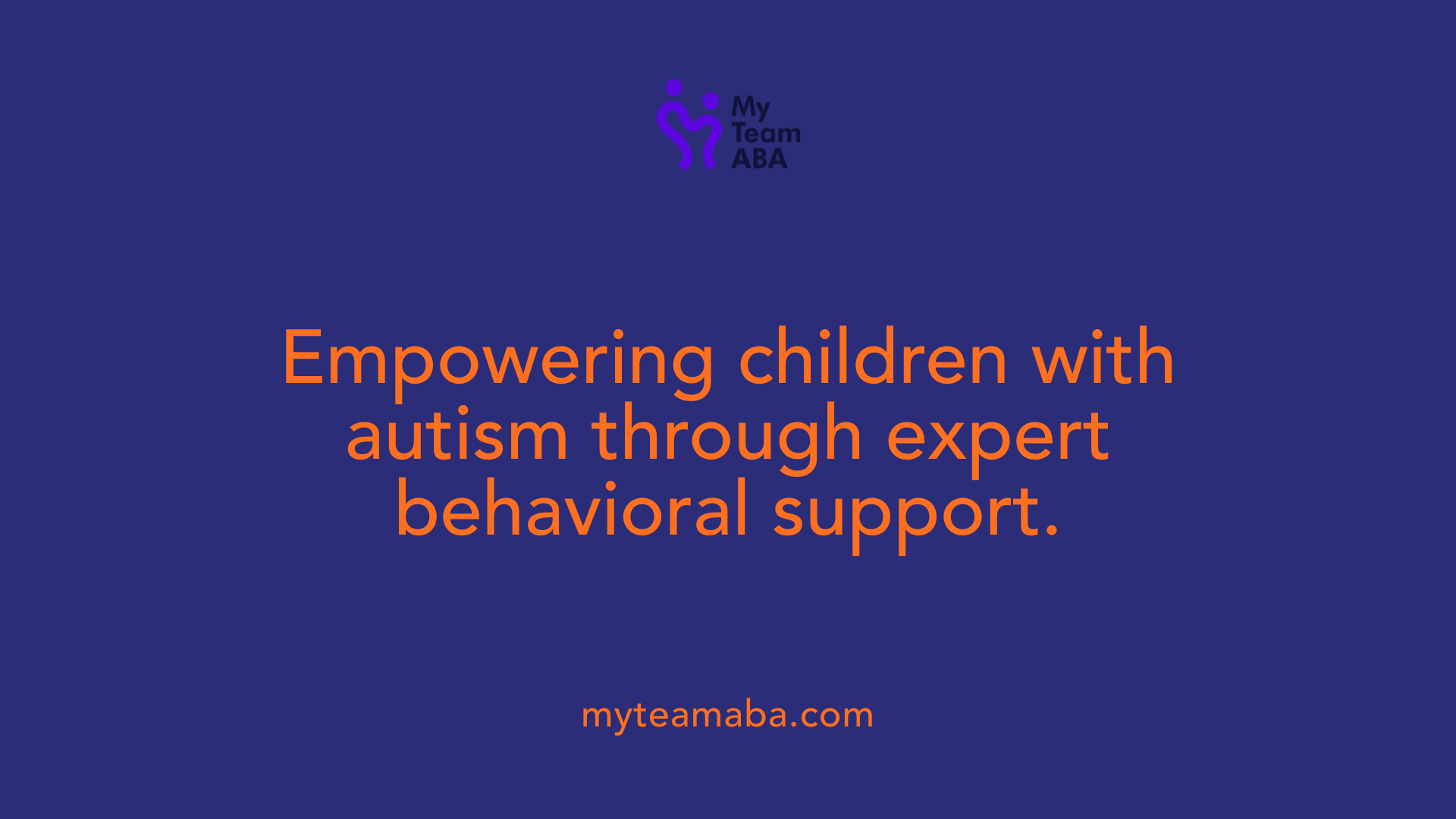Understanding the Role of a BCBA in ABA Therapy
April 30, 2025
Harnessing Behavioral Science for Positive Change

Introduction to the Essential Role of BCBAs in ABA Therapy
Applied Behavior Analysis (ABA) has become a gold standard for supporting individuals with autism spectrum disorder (ASD) and other developmental challenges. Central to this science-based approach are Board Certified Behavior Analysts (BCBAs), highly trained professionals who design, oversee, and adjust behavioral interventions harnessed to enhance quality of life. This article explores the multifaceted role of BCBAs, their qualifications, responsibilities, and impact across various therapeutic environments.
What is a BCBA and their primary responsibilities in ABA therapy
What is a BCBA and what is their role in ABA therapy?
A BCBA, or Board Certified Behavior Analyst, is a highly trained professional who specializes in behavior analysis principles. Certified by the Behavior Analyst Certification Board (BACB), a BCBA typically holds a master’s degree in behavior analysis, psychology, or a related field. Their expertise lies in assessing behavior, developing customized treatment plans, and overseeing the implementation of therapy.
In ABA therapy, the BCBA conducts detailed assessments to understand an individual’s behaviors and the factors influencing them. Using this information, they create personalized intervention strategies aimed at increasing beneficial behaviors like communication and independence, while decreasing harmful behaviors such as aggression or self-injury.
The BCBA supervises therapy sessions, often working with Registered Behavior Technicians (RBTs) or other therapists, ensuring that interventions are applied correctly and effectively. They provide ongoing training and supervision, analyze data collected during therapy, and make necessary adjustments to treatment plans to optimize progress.
Beyond direct supervision, BCBAs also collaborate with families, teachers, and other professionals to support the individual’s development in various environments such as home, school, or community settings. Their overarching goal is to facilitate positive change using evidence-based strategies, ensuring that each person achieves meaningful improvements in behavior and daily functioning.
Educational pathways and certification process for becoming a BCBA

What are the educational and certification requirements to become a BCBA?
To pursue a career as a Board Certified Behavior Analyst (BCBA), individuals must meet specific educational and experiential requirements. First, candidates need to earn a master's degree in behavior analysis, psychology, education, or a related field from an accredited institution.
A crucial part of the process involves completing graduate coursework that aligns with standards set by the Behavior Analyst Certification Board (BACB). This coursework typically includes at least 270 hours of certified content, often organized into a verified course sequence (VCS). It covers essential topics such as behavior assessment, ethical practice, and intervention strategies.
Alongside coursework, aspiring BCBAs must accumulate supervised practical experience. This involves completing between 1,500 to 2,000 hours of fieldwork under the supervision of a qualified BCBA or other credentialed professional. The supervised experience ensures that candidates gain hands-on skills in conducting assessments, developing intervention plans, and applying behavior analysis techniques.
Once educational and experiential criteria are fulfilled, candidates need to compile documentation including official transcripts, verifications of supervised hours, and other required materials submitted to the BACB for approval.
Upon approval, candidates can sit for the certification exam, which is administered by Pearson VUE. The exam tests knowledge of core principles of behavior analysis, ethical standards, and practical applications. Successful completion of the exam results in certification as a BCBA.
Maintaining certification involves ongoing professional development. BCBAs must complete continuing education every two years, adhere to ethical guidelines, and recertify through the BACB. This ensures that professionals stay current with advances in the field and uphold high standards of practice.
Becoming a BCBA is a rigorous process designed to ensure that certified individuals are thoroughly prepared to provide effective, ethical behavior analysis services.
Contributions of BCBAs to therapy and behavioral health
 Behavior Analysts with the certification of BCBA play a vital role in advancing therapy and behavioral health through a variety of specialized functions.
Behavior Analysts with the certification of BCBA play a vital role in advancing therapy and behavioral health through a variety of specialized functions.
One of their primary contributions is the design and supervision of personalized treatment plans. BCBAs develop these programs based on detailed assessments such as functional behavior assessments (FBA) that identify the root causes of behaviors. They then oversee the implementation of evidence-based strategies like positive reinforcement, ensuring that each plan is tailored to the individual’s needs.
Assessment and data analysis are fundamental to a BCBA's role. They regularly conduct assessments to understand behavioral patterns and collect data on client progress. By analyzing this data weekly, BCBAs can make informed adjustments to the interventions, optimizing outcomes and ensuring ongoing effectiveness.
Collaboration forms another core aspect of their work. BCBAs work closely with families, teachers, speech therapists, occupational therapists, and psychologists. This team-based approach ensures consistency across settings and maximizes the support provided to individuals. They also train caregivers and staff, equipping them with the skills needed to reinforce positive behaviors consistently.
Beyond direct service provision, BCBAs are active in advocacy and professional development. They participate in community outreach to raise awareness about ABA practices and contribute to ongoing education for fellow professionals. This commitment helps improve community acceptance and accessibility of behavioral health services.
Overall, BCBAs contribute significantly to therapy and behavioral health by crafting individualized, data-driven interventions, fostering teamwork, and pushing for broader awareness and understanding. Their work enhances the quality of life for many individuals by applying compassionate, science-based strategies rooted in behavior analysis principles.
| Area of Contribution | Specific Tasks | Additional Details |
|---|---|---|
| Treatment Planning | Designs and supervises ABA programs | Uses assessments to inform interventions |
| Data-Driven Adjustments | Monitors progress through data | Modifies strategies based on ongoing analysis |
| Collaboration | Works with families, educators, and health professionals | Provides training and ongoing support |
| Advocacy & Development | Engages in outreach and education | Raises awareness about ABA benefits |
This comprehensive approach underscores the essential role of BCBAs in improving behavioral health outcomes and supporting individuals' growth across multiple environments.
Scope of practice and specialization areas for BCBAs

What is the scope of practice and specialization areas of BCBAs?
Board Certified Behavior Analysts (BCBAs) operate within a defined scope that centers on applying principles of behavior analysis to assess, develop, and oversee behavioral interventions. Their primary responsibilities include conducting detailed assessments of individuals’ behaviors, designing tailored treatment plans, implementing evidence-based interventions, and analyzing progress through data collection.
They work across a wide range of settings, such as clinics, schools, homes, and workplaces. Their services are offered directly to clients or through supervision of other professionals like Registered Behavior Technicians (RBTs) and Behavior Consultants (BCaBAs). BCBAs are trained to adapt their practices to meet the needs of various populations and environments.
Specializations within the field include working with individuals diagnosed with autism spectrum disorder (ASD), developmental disabilities, or other behavioral challenges. Many BCBAs expand their expertise through additional certifications, such as the Autism Spectrum Disorder Certification. They can also focus on organizational behavior management, applying their skills to enhance performance, safety, or learning in workplace or educational settings.
Although BCBAs do not diagnose or provide psychotherapy directly, their work is guided tightly by ethical standards—ensuring services are delivered responsibly and effectively. Their practice is rooted in the science of learning and behavior, emphasizing positive reinforcement and environmental modifications to promote meaningful change.
Overall, BCBAs’ scope of practice combines rigorous assessment, innovative intervention design, collaboration with clients and teams, and ongoing data analysis to support improved outcomes in diverse areas of human behavior.
Work environments, career prospects, and technology in BCBA practice
BCBAs typically work across a range of settings, including clinics, schools, hospitals, long-term care facilities, and in clients’ homes. These diverse environments allow them to serve various populations, from children with autism spectrum disorder (ASD) and developmental disabilities to adults in brain injury rehabilitation or behavioral gerontology. The variety of workplaces offers BCBAs opportunities to specialize and adapt their skills to different needs.
Career outlook for BCBAs is highly positive. The demand for behavior analysts has grown substantially due to the increasing recognition of ABA’s effectiveness in treating autism and other behavioral challenges. According to projections, job growth for BCBAs is expected to reach about 8% from 2020 to 2030, a rate that surpasses many other professions.
Advancement potential is strong, with options including consulting roles, program management, research positions, teaching, and specialization in niche areas like organizational behavior or mental health. Additionally, the integration of new technology and telehealth platforms creates fresh opportunities for delivering services remotely, expanding access, and enhancing client outcomes.
In developing and executing treatment plans, BCBAs conduct detailed assessments using observations, interviews, and standardized tools to understand each individual’s unique behavior patterns. Based on assessment data, they formulate specific goals aimed at improving communication, social skills, and independence. The treatment strategies, grounded in ABA techniques such as positive reinforcement and antecedent interventions, are then incorporated into a comprehensive behavior intervention plan.
Throughout intervention, BCBAs continually monitor progress through systematic data collection and analysis. This ongoing process allows them to make necessary adjustments to keep treatment effective and tailored to evolving needs. Collaboration with caregivers, teachers, and other professionals is crucial to ensure consistency and generalization of learned skills, further supporting successful outcomes.
Supervision and collaboration with other professionals

What is the supervision and collaboration role of BCBAs with other professionals?
BCBAs are essential leaders in both supervision and teamwork in behavior analysis. They oversee the work of trainees, Registered Behavior Technicians (RBTs), and other behavior analysts by conducting regular monitoring, providing constructive feedback, and ensuring all procedures align with ethical and professional standards.
Supervisory duties include reviewing data collection, observing intervention implementation, and guiding staff in adherence to treatment plans. This oversight helps maintain high-quality services and fosters ongoing professional growth for team members.
In addition to supervision, BCBAs actively collaborate with a range of professionals to create comprehensive and individualized support for clients. They work closely with speech therapists, occupational therapists, psychologists, educators, and medical providers. Through active communication, shared decision-making, and coordinated efforts, they develop integrated treatment strategies that meet the varied needs of each individual.
Building strong teamwork skills such as listening, empathy, and effective communication is fundamental for BCBAs. These skills facilitate conflict resolution, consensus-building, and the seamless integration of interventions.
Ultimately, the combined supervision and collaboration efforts of BCBAs ensure ethical compliance, promote effective treatment outcomes, and support the continual development of all team members involved in delivering behavior-analytic services.
The importance of BCBAs in supporting children with autism and other behavioral issues

Why are BCBAs important in supporting children with autism?
Board-Certified Behavior Analysts (BCBAs) are crucial professionals in the field of autism support. They possess advanced training in behavior analysis principles, enabling them to develop personalized therapy programs tailored to each child's needs. BCBAs begin their work by conducting detailed assessments, often using tools like Functional Behavior Assessments (FBAs), which help identify the reasons behind specific behaviors.
Based on these assessments, BCBAs design individualized intervention plans emphasizing applied behavior analysis (ABA). These plans focus on increasing helpful behaviors such as communication and social skills while reducing harmful or disruptive actions. Throughout the therapy process, BCBAs continuously monitor progress by collecting and analyzing data, making adjustments as necessary to enhance effectiveness.
In addition to program design, BCBAs supervise behaviour technicians and other staff, ensuring that interventions are implemented correctly and ethically. They also provide training and guidance to families, empowering them to apply strategies consistently at home and in community settings.
Collaboration is vital in this role. BCBAs work closely with families, teachers, speech therapists, occupational therapists, and psychologists to provide comprehensive support. Their expertise ensures that children with autism receive effective, science-based interventions that promote skill development and independence.
Overall, BCBAs play an indispensable role in supporting children with autism, helping to improve their communication, social interaction, and daily living skills, ultimately enhancing their quality of life.
Conclusion: The Pivotal Role of BCBAs in Transforming Lives
BCBAs stand at the forefront of applied behavior analysis, bringing scientific expertise and compassionate care to individuals with autism and other developmental challenges. Their rigorous educational pathways, adherence to ethical standards, and versatile roles across various settings enable them to craft personalized, effective interventions that foster meaningful progress. As the demand for ABA therapy continues to rise, so does the importance of BCBAs in guiding clinical teams, supervising therapeutic activities, and collaborating with families and professionals to maximize client outcomes. Their ongoing professional development and integration of innovative technologies promise a future where behavioral health services are more accessible, effective, and tailored to each individual’s needs. Recognizing the profound impact of BCBAs underscores their essential contribution to improving lives and empowering communities.
References
- Understanding the Role: What is a BCBA? - Move Up ABA
- Applied Behavior Analysis (ABA) | Autism Speaks
- What is the Role of a BCBA in ABA Therapy? - Chicago Pediatric ...
- What is a BCBA? The Role of the Board-Certified Behavior Analyst
- Understanding the Role of BCBAs in Behavioral Health
- ABA vs. BCBA: Unpacking the Key Differences
- What Does a BCBA Do? Understanding Their Role in ABA Therapy
- Board Certified Behavior Analyst
- What Is a BCBA & Their Role in ABA Therapy? - Precious Care
